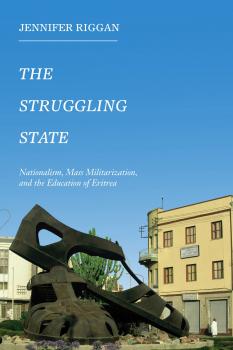Dr. Riggan Publishes Book on Eritrean Educational Struggles

Jennifer Riggan, associate professor of international studies at Arcadia University, is celebrating the release of her new book, The Struggling State: Nationalism, Mass Militarization, and the Education of Eritrea with a book launch on Feb. 11 at 5:30 p.m. The book will be released on Feb. 16 through Temple University Press.
Beginning with the development of Eritrea as a country in the early 1990s, Riggan analyzes the influence of a controversial system of “national service,” which results in the forced, indefinite militarization of the vast majority of Eritrean citizens, many of whom have not been released from service in nearly two decades. She specifically identifies the impact it has on the education system, especially after a 2003 law required students to complete their final year of secondary school in a military facility.
“Eritreans have no free will,” Riggan said about the required military service, which when it was originally instituted in 1994 legally required only 18 months of service. “They have no ability to control their everyday lives.”
Riggan, who taught English in Eritrea during the 90s and conducted an ethnographic study from 2003 to 2005, said the government uses the 1998 border war with Ethiopia as a reason for not releasing citizens from national service. Ethiopia refuses to relinquish control of a key town to Eritrea, which was specified in the peace agreement. However, no fighting has occurred between the two nations since 2001.
Although Riggan had hoped to explore the ways in which the Eritrean education system was helping build and develop the nation, and profile how teachers engage students, but she found educators and students alike acting out under the pressure of the national service. Riggan said the “repurposing” of schooling for military service had caused students to disregard their education. Many students who previously had no behavioral problems were now cutting classes, arriving late, and undermining their education.
Even worse was watching the teachers struggle to handle their own frustration with this repurposing and still maintain structure in the classroom. Many, Riggan said, began to act out similar to the students.
“Teachers in some ways joined in with the students,” Riggan said. “They also came to school late and cut class, and didn’t take their teaching as seriously…but then they also got very anxious because they worried about students growing up without a proper education and losing hope for the future. Many became very strict. Sometimes, it was the same teacher that did both.”
The Struggling State provides insight into other problems caused by national service that will need to be addressed in the years ahead, especially the forced migration of young children before they matriculate into military service. Riggan said that more and more data shows that children, as young as primary school, are leaving Eritrea alone.
“Why so young though?” Riggan often asks herself. She said there is still no answer as to why children that young would need to flee so early, but Riggan suspects that it has something to do with the disillusion children feel upon seeing their older brothers and sisters and even their parents drawn into indefinite service. However, It is difficult to get a clear picture of the face of “everyday authoritarianism” in Eritrea, as Riggan terms it because while Eritrea has recently started to open its borders to researchers, it remains to be seen whether independent ethnographic research can be conducted in the country. To make it even more difficult, if a researcher publishes anything negative about the country, they are refused a visa for returning to Eritrea for further research– as Riggan believes she would for her book.
Riggan is torn about the next steps to remedy Eritrea’s problems. Would new leadership fix the problems or cause more problems? Is international engagement or censure a more productive way to encourage Eritrea to improve its human rights record? Regardless, Riggan believes that the coerciveness of the Eritrean state is at the heart of these troubles.
“The overall conclusion of the book is that the state’s coerciveness has unravelled people’s trust in the government in general, and the legitimacy of the government’s nation-building project in particular,” Riggan said. “Until they get people’s trust back, I think we are going to see a lot of people continue to leave the country.”
The Struggling State: Nationalism, Mass Militarization, and the Education of Eritrea is Riggan’s first book, which grew from her doctoral research on the Eritrean secondary school system. She has published several anthropological and ethnographic articles on Eritrea, as well as Africa. Her research was funded by a Fulbright research fellowship, a Social Science Research Council International Dissertation Field Research Fellowship and a Spencer/National Academy of Education Postdoctoral Fellowship.
Copies of Riggan’s book can be purchased on the Temple Press website.


